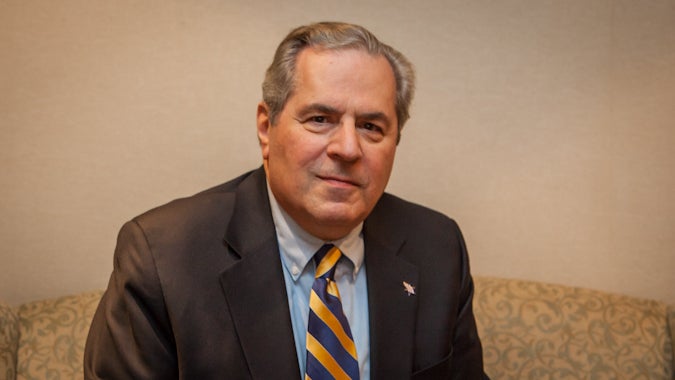Philly ‘shark tank’ a matchmaker for startups and angel funding

Richard Anthony (Emily Cohen/for NewsWorks)
On a recent morning, an aspiring entrepreneur stood before a panel of angel investors. He had 10 minutes to convince them that his concept was worth the $300,000 he needed to take it to the next level. In a clear, confident voice, he started to tell his story. The energy in the room was electric.
“Prime Time” is a bi-weekly series featuring people over 50 in the Philadelphia region who are taking on new challenges. They are starting new businesses, dedicating themselves to activism, and becoming a part of the change they wish to see. Email us to nominate someone.
—
On a recent morning, an aspiring entrepreneur stood before a panel of angel investors. He had 10 minutes to convince them that his concept was worth the $300,000 he needed to take it to the next level. In a clear, confident voice, he started to tell his story. The energy in the room was electric.
“That’s what a great pitch is. It’s a story, based on personal experience, that identifies a specific problem and offers a marketable solution,” says Richard Anthony, founder and president of nonprofit The Entrepreneur’s Network (TEN), co-sponsored by the likes of University City Science Center, Villanova University and Bancorp.
Five times a year, Anthony, who admits to being “over 65,” hosts a meeting at Overbrook Golf Club to introduce investors to half a dozen entrepreneurs for the purpose of launching startups, generating wealth and turning dreams into reality. If this sounds like ABC’s “Shark Tank,” rest assured: Anthony had the idea first. He’s been hosting pitch events since 2000, nine years before the the TV show first aired.
There’s another major difference. While “Shark Tank” presents a mix of bankable and laughable concepts, most of which are aimed at QVC or retail, Anthony focuses on startups seeking solutions to global problems.
Cutting the corporate tether
Anthony got his start working in human resources for Fortune 500 companies. “When I formed my own consulting firm, I realized there was a need to help former CEOs and CFOs become startups or buy startups. They were ready to leave the corporate world, but they had no knowledge of how to make things happen outside of it.”
His first meeting in 2000 had only six people. His second had a dozen. “I had no idea what I was doing,” Anthony says. “Now I draw an average of 60 people, with over 1,200 on my mailing list in the tri-state area.”
Just like TV game shows, in which contestants can rely on “lifeline” phone calls, Anthony throws out a lifeline to angel investors who can’t attend his events. “We have investors in New York, Boston, Pittsburgh and D.C. who we keep in the loop when there’s a startup that matches their interests.”
How does Anthony select the six lucky entrepreneurs who pitch at his meetings? “I play God,” he says.
Actually his approach is less celestial and more pragmatic: “I ask candidates for just an executive summary, not an entire business plan. I have a sense of what investors will find compelling.”
Investors don’t blink at the ask, usually $500,000 to $2 million. After the 10-minute pitch, the entrepreneur is peppered with questions by a panel of three “sharks,” then from the audience. An entrepreneur could rise or fall depending on his or her answers.
Matchmaking with the ‘deep-pocket crowd’
Anthony has perfected a method for reducing the tension. The event starts off as an informal schmooze fest over a continental breakfast buffet. Before the six startups make their pitch, Anthony passes a microphone around, asking everyone to take “just a minute” to introduce themselves. “I try to keep an equal mix of investors, entrepreneurs and individuals who provide services to startups — attorneys, web designers, marketing people,” says Anthony.
The credentials are impressive. This is a deep-pocket crowd, but one that doesn’t take itself too seriously. There are sparks of self-effacing humor and the kind of camaraderie found among high rollers who like their bagels with a side of humility.
Anthony, who was himself an angel investor for 25 years, prefers the role of matchmaker these days. Why? Better ask Mrs. Anthony. “In almost every one of my investment faux pas, my wife saw something I missed or dismissed. Had I heeded her alarms …,” Anthony says, trailing off.
While he no longer dabbles in funding startups, Anthony views TEN as a family affair. “I hope my children will run it someday,” he says. “My son Mark already helps run events, and his wife Linda collects money at the door.” Father of five, grandfather of 15 with one great grandchild and another on the way, Anthony is the patriarch of an entrepreneurial dynasty. “I have another son who is with a New York City equity firm. He often knows of individuals seeking investment opportunities.”
“They call me ‘the Connector,'” says Anthony, who, in addition to running TEN, has his own management consulting firm, The Anthony Group, Inc.; is an adjunct instructor at Villanova University; and currently hosts two cable television shows at Radnor Studio 21, and has launched an Internet radio program, The Entrepreneurs Network Radio.
When does he plan to slow down? Never. “Retirement,” Anthony says, “is the anteroom to death.”
WHYY is your source for fact-based, in-depth journalism and information. As a nonprofit organization, we rely on financial support from readers like you. Please give today.

